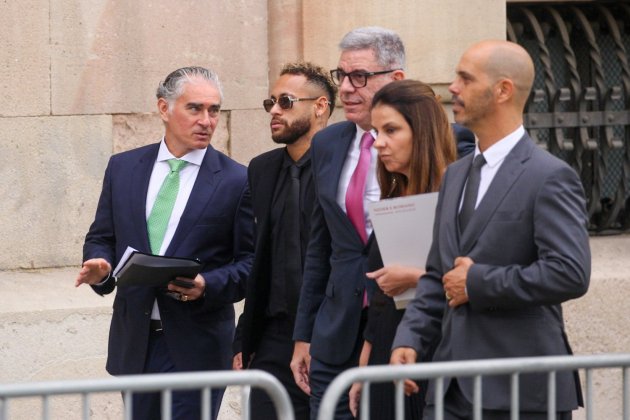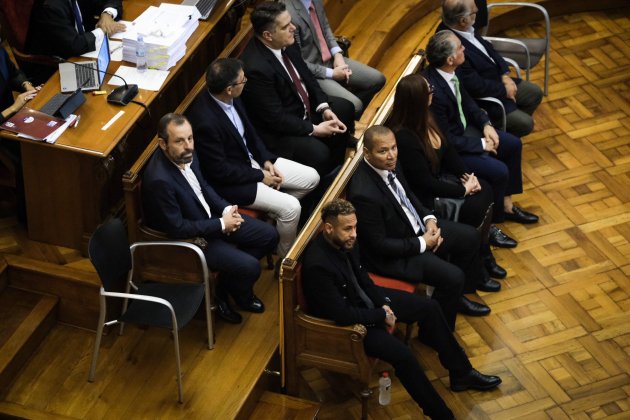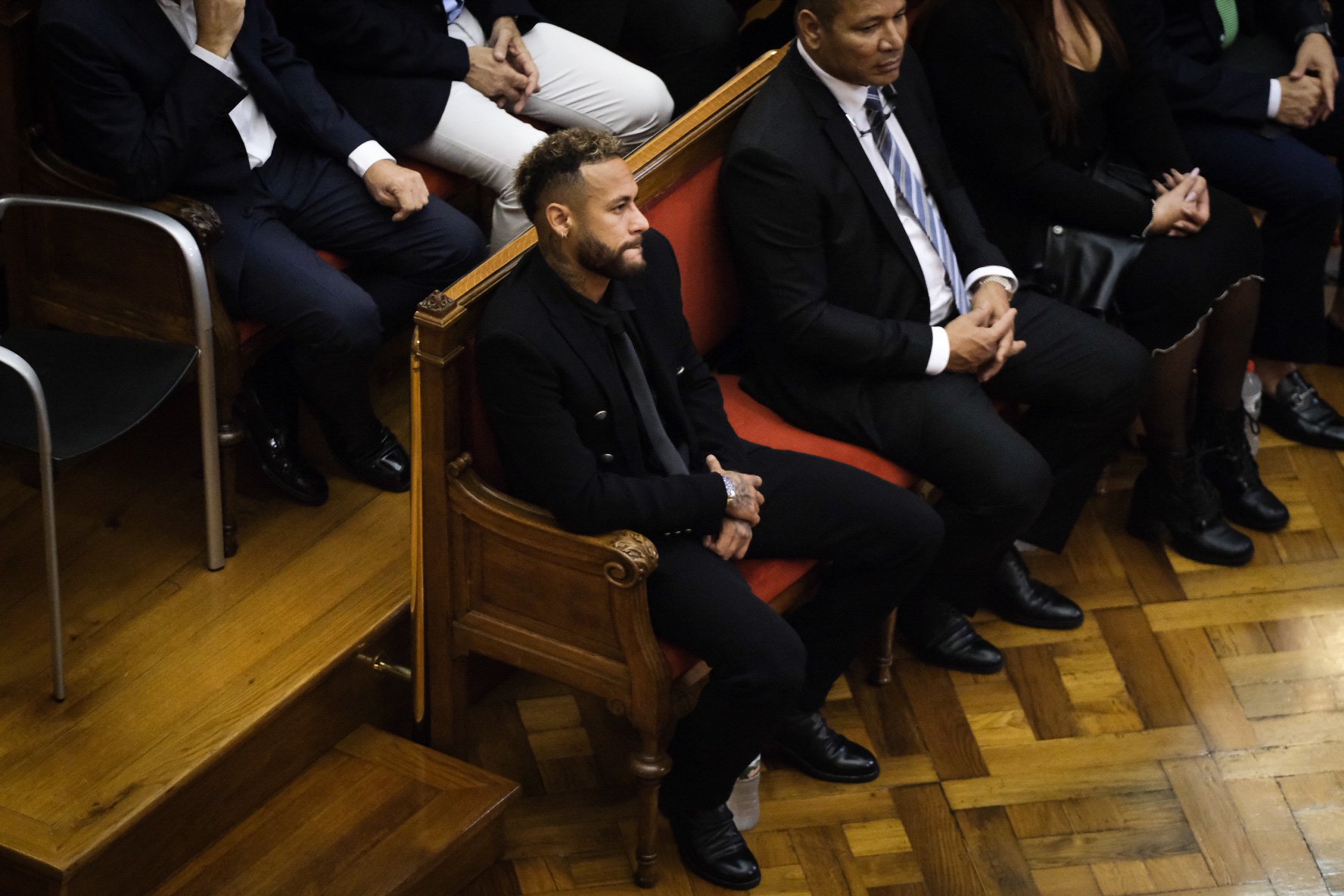Barcelona's Palau de Justicia, the judicial complex by the Arc de Triomf on Passeig Lluís Companys, has today mutated into a media focus for the world of football, with the opening of the so-called Neymar 2 trial in one of its chambers, with sessions scheduled for all of this week and several other dates in the latter part of October. The Brazilian footballer Neymar da Silva Santos Jr, who now plays for Paris Saint Germain, is on trial as a defendant, together with his parents and two former presidents of Futbol Club Barcelona, Sandro Rosell and Josep Maria Bartomeu. The case is centred on Neymar's transfer from Santos to FC Barcelona, between the years 2011 and 2013. In the first session it was decided that Neymar himself will give evidence in the second session of the trial: on Tuesday, October 18th.
The Spanish public prosecutor, along with a private prosecution conducted by Brazilian fund DIS, which held 40% of the player's rights, accuse the defendants of having hidden the real price of the transfer: it was announced for 17 million euros when it was worth 40 million euros, and they are calling for prison terms and huge fines. It is a strongly media-focused trial, like that of Argentine star Leo Messi for tax fraud. In this case, 160 professionals from 49 media have been accredited, 10 of them from international media, according to the court press office. Below, all the key information you need to know about the Neymar 2 trial:
Who are the defendants in the Neymar 2 case?
In the trial of the Neymar 2 case, six individuals will sit in the dock: Sandro Rosell, former president of the Barça club; Josep Maria Bartomeu, also a former club president, but accused of criminal actions when he was vice president of the club; Neymar da Silva Santos, father of the player; Neymar da Silva Santos Junior, the footballer; Nadine Gonçalves da Silva Santos, the player's mother, and Odílio Rodrigues Filho, president of the Santos club, based in the Brazilian city of the same name. There are also legal entities accused: Futbol Club Barcelona, Santos Futbelo Clube, and N&N Consultoria esportiva y entreprise LTDA, a company belonging to the Neymar family.
What are the charges and the penalties demanded?
The Spanish public prosecutors and the private prosecution of the Brazilian fund DIS accuse the Neymars and the directors of Barça and Santos of offences of fraud and corruption in business. The public prosecutors demand: 5 years in prison for Rosell, 2 years in prison for Neymar (which the private indictment raises to 5 years in prison) and his father, and 1 year in prison for his mother, along with 3 years in prison for the president of Santos for the crime of fraud. The public prosecution does not accuse Bartomeu. It also demands that Rosell and Neymar pay a fine of 10 million euros each. As for the legal entities, the public prosecutors call for Barça and Santos to each pay 7 million euros for the two offences, and Neymar's company 1.4 million. And finally, they demand that Rosell and the two clubs compensate the DIS fund to the tune of 3,228,400 euros, which is the amount that it would have received under the player's real transfer price, which was 40 million euros, according to the Spanish indictment, although the private indictment raises it to 85 million.
Neymar 2 case: how long will the trial last?
Due to the number of defendants, the trial of the Neymar 2 case will be held in a jury trial chamber at the Barcelona Audience court. Seven sessions have been scheduled: over the five days from October 17th to 21st, and two more sessions, on October 28th and 31st. The defence had requested that the defendants testify at the end of the trial, and have set the dates for October 21st and 28th. However, on the first day of the trial, the footballer Neymar has been granted permission to testify on Tuesday, October 18th. The court of the sixth section of the Barcelona Audience that will try the case is made up of three judges: José Manuel del Amo, presiding judge; Jorge Obach and Miguel Angel Ogando.


Why is the Real Madrid club president testifying?
The president of Real Madrid, Florentino Pérez, is set to testify as a witness in Tuesday's session, at the request of the private prosecution. In an interview, Pérez has asserted that the transfer of Neymar was more expensive than Barça said because he negotiated it and for the termination of the contract Santos had to be paid 65 million euros. The president of Madrid will testify in the trial via a digital connection (webex) and, thus, will not have to travel to Barcelona.
Can Neymar absent himself from the trial?
If the charges facing Neymar were punishable by only 2 years or less in prison (the limit for avoiding prison if you have no previous record) - precisely, the sentence that the public prosecution is demanding - he could be tried in absentia and his lawyer could defend him. The Brazilian private prosecution, however, has demanded a sentence of 5 years in prison and, therefore, he would normally be expected to attend all sessions. However, as expected, his lawyer asked the court on this first day's session, that for professional reasons, he testify as early as possible and then be excused from the trial, as well as delivering his final right to a "last word" by digital connection, and in the end, the court has allowed him to testify first thing in the morning on Tuesday 18th October. Paris Saint Germain has two games scheduled in the two weeks of the trial: one French league match and a Champions League match (on 25th October with Maccabi Haifa). In terms of other football dates, the 2022 World Cup in Qatar begins on November 20th, and ahead of this, national teams will gather in preparation, but these dates are unlikely to be considered as an argument for dispensation. Nevertheless, it seems his professional timetable does have the sympathy of the court: this Monday, the judge commented in recognition of the footballer's hours, that on Sunday night "he was scoring a goal and I was in bed".
Could Neymar go to jail?
Yes, although it is unlikely. The public prosecutors are demanding 2 years in prison, but if the court agrees and gives this sentence, his entry into prison could be suspended as is normal practice for sentences up to two years, if the person has no previous criminal record and it is not an exceptional case of corruption or social alarm. However, the private prosecution has asked for 5 years in prison. The defence lawyers may claim that the proceedings have taken a long time - the case began in 2015 - and therefore that the punishment, should he be found guilty, should be reduced accordingly. In addition, the sentence of the Barcelona Audience will not be final, as appeal can be lodged at first the Catalan High Court (TSJC), and then to the Spanish Supreme Court, as an appeal of cassation, which could mean that, in the event of a guilty verdict in this trial, the execution of the sentence would probably not take place for a couple of years.
How many Neymar cases are there?
The transfer of the footballer Neymar Junior led to the opening of different legal and financial fronts with FC Barcelona. The National Audience initially investigated this operation, which was divided into three proceedings, the last of which was thrown out. The Neymar 1 case was closed at the Barcelona Audience with an out-of-court agreement: Barça, as a legal entity, paid 5.5 million euros after being convicted of tax crimes and the exemption of Sandro Rosell and Josep Maria Bartomeu from liability. The Neymar 2 case brings the Barcelona club and its two former presidents back to into the dock.
Is there a chance for an out-of-court deal between prosecutions and defences?
There was a chance of this, but it appears that boat has now sailed. The public prosecutor's office and the private prosecution could have reached an agreement with the defendants prior to the trial, to be announced to the court as the trial begins, with deals usually leading to a reduction in the punishment. But no negotiations were spoken of in advance, and the private prosecution conducted by the Brazilian DIS fund denied that there were any approaches. So, the trial will now be played out.

